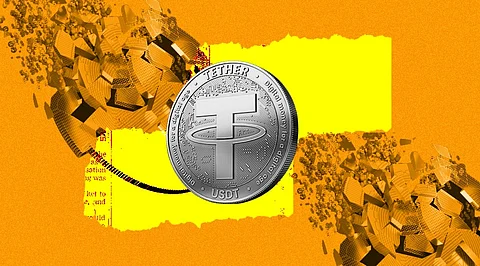

The collapse was stunning, a bank run that happened with lines of codes, not sidewalks crowded outside a branch. The crash was the kind of risk in the fast-growing cryptocurrency market that regulators have been warning about. It also brought renewed attention to the role of stablecoins in an increasingly unpredictable space. Stablecoins are supposed to offer a safe way for crypto users and investors to trade in and out of volatile cryptocurrencies. But the UST and luna collapse strengthens the view that the design of some stablecoins poses serious risks. While Terra investors were the ones most immediately hurt, its downfall could have both short-term and long-term ripple effects for crypto and beyond, especially as skeptical legislators and regulators survey the damage.
Terra is a blockchain protocol that uses fiat-pegged stablecoins to power price-stable global payments systems. According to its white paper, Terra combines the price stability and wide adoption of fiat currencies with the censorship-resistance of Bitcoin (BTC) and offers fast and affordable settlements.
Development on Terra began in January 2018, and its mainnet officially launched in April 2019. As of September 2021, it offers stablecoins pegged to the U.S. dollar, South Korean won, Mongolian tugrik, and the International Monetary Fund's Special Drawing Rights basket of currencies — and it intends to roll out additional options.
Terra's native token, LUNA, is used to stabilize the price of the protocol's stablecoins. LUNA holders are also able to submit and vote on governance proposals, giving it the functionality of a governance token.
Some stablecoins derive their value from being fully backed by reserves – if investors decide they ever want out, the stablecoin's foundation should theoretically have enough cash on hand to repay all of them at once. UST, on the other hand, is an algorithmic stablecoin, which relies upon code, constant market activity, and sheer belief in order to keep its peg to the dollar. UST's peg was also theoretically propped up by its algorithmic link to Terra's base currency, Luna.
For the last six months, investors have been buying UST for one main reason: to profit off a borrowing and lending platform called Anchor, which offered a 20% yield to anyone who bought UST and lent it to the protocol. When this opportunity was announced, many critics immediately likened it to a Ponzi scheme, saying it would be mathematically impossible for Terra to give such a high return to all of its investors. Terra team members even acknowledged that this was the case—but likened the rate to marketing spending to raise awareness, in the same way, that Uber and Lyft offered severely discounted rides at the beginning of their existence.
This caused UST to depeg from the dollar. A bank run ensued, with investors who had earned interest via Anchor scrambling to get out the door before it was too late.
In light of the mega crash, the British Treasury Department has announced plans for regulating stablecoins. The British Treasury secretary recently said, "Legislation to regulate stablecoins, which were used as a means of payment, will be part of the Financial Services and Markets Bill which was announced in the Queen's Speech."
The US treasury secretary, Janet Yellen, also called for stablecoin's regulation amid the recent TerraUSD de-pegging fiasco which triggered the Terra Luna wipe out. Although she stressed the fact that stablecoins are not yet a threat to financial stability, she insisted that new regulation is the need of the hour amid this speculative wave.
Following the Terra LUNA crash amid the UST de-pegging fiasco, South Korea also has stated that it intends to look into some kind of stablecoin regulation. As per local media reports, South Korean financial regulators are undertaking an emergency investigation of cryptocurrencies to expedite the adoption of the "Digital Asset Basic Act." The cryptocurrency went through a 3300 percent spike over the weekend after being nearly obliterated in the past week.
Currently, as per data from CoinMarketCap, the token is trading at US$0.0001673, 19.96 percent down in the last 24 hours.
Join our WhatsApp Channel to get the latest news, exclusives and videos on WhatsApp
_____________
Disclaimer: Analytics Insight does not provide financial advice or guidance. Also note that the cryptocurrencies mentioned/listed on the website could potentially be scams, i.e. designed to induce you to invest financial resources that may be lost forever and not be recoverable once investments are made. You are responsible for conducting your own research (DYOR) before making any investments. Read more here.
